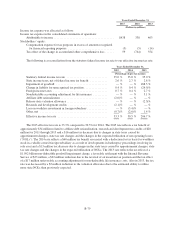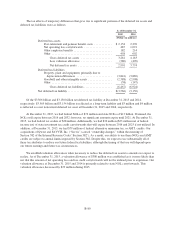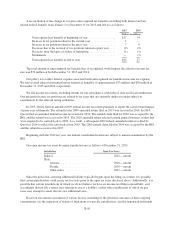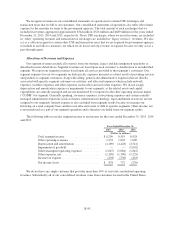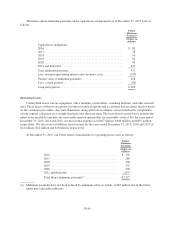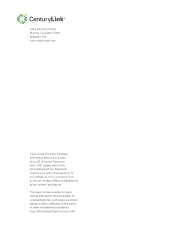CenturyLink 2015 Annual Report Download - page 195
Download and view the complete annual report
Please find page 195 of the 2015 CenturyLink annual report below. You can navigate through the pages in the report by either clicking on the pages listed below, or by using the keyword search tool below to find specific information within the annual report.the Abbott claims are similar to the Fulghum breach of fiduciary duty claim (Count II), on which the Fulghum
court denied class certification. The Court has stayed proceedings in Abbott indefinitely, except for limited
discovery and motion practice as to approximately 80 of the plaintiffs. On February 14, 2013, the Fulghum court
dismissed the majority of the plaintiffs’ claims in the case. On interlocutory appeal, the United States Court of
Appeals for the Tenth Circuit ruled on February 24, 2015, that the plan documents reviewed do not support any
claim for vested benefits, and affirmed the district court’s dismissal of claims based on those documents. The
Tenth Circuit decision allowed a subset of claims for vested benefits to return to the district court for further
proceedings. The Tenth Circuit also affirmed the district court’s dismissal of all age discrimination claims. The
Tenth Circuit reversed the district court’s determination that the statute of repose under the Employee Retirement
Income Security Act of 1974, as amended (“ERISA”), is a time bar to the breach of fiduciary duty claims of
fifteen named plaintiffs. On June 10, 2015, the district court in Fulghum granted summary judgment to
defendants on an additional group of claims for vested benefits. On July 27, 2015, pursuant to the terms of a
stipulation by the parties, the district court in Fulghum granted judgment in favor of defendants on all remaining
and unadjudicated vested benefits claims. This judgment is without prejudice to any rights the parties may have
to pursue any additional appellate relief. As to any further proceedings that may occur in the district court,
defendants will continue to vigorously contest any remaining claims in Fulghum and Abbott. We have not
accrued a liability for these matters because we believe it is premature (i) to determine whether an accrual is
warranted and (ii) if so, to determine a reasonable estimate of probable liability.
On July 16, 2013, Comcast MO Group, Inc. (“Comcast”) filed a lawsuit in Colorado state court against
Qwest Communications International, Inc. (“Qwest”). Comcast alleges Qwest breached the parties’ 1998 tax
sharing agreement (“TSA”) when it refused to partially indemnify Comcast for a tax liability settlement Comcast
reached with the Commonwealth of Massachusetts in a dispute to which we were not a party. Comcast seeks
approximately $80 million in damages, excluding interest. Qwest and Comcast are parties to the TSA in their
capacities as successors to the TSA’s original parties, U S WEST, Inc., a telecommunications company, and
MediaOne Group, Inc., a cable television company, respectively. In October 2014, the state court granted
summary judgment in Qwest’s favor. In December 2015, the Colorado Court of Appeals affirmed the judgment.
Comcast has filed a petition with the Colorado Supreme Court to review the Court of Appeals judgment. We
have not accrued a liability for this matter because we do not believe that liability is probable.
The local exchange carrier subsidiaries of CenturyLink are among hundreds of defendants nationwide in
dozens of lawsuits filed by Sprint Communications Company and affiliates of Verizon Communications Inc. The
plaintiffs in these suits have challenged the right of local exchange carriers to bill interexchange carriers for
switched access charges for certain calls between mobile and wireline devices that are routed through an
interexchange carrier. In the lawsuits, the plaintiffs are seeking refunds of access charges previously paid and
relief from future access charges. In addition, these and some other interexchange carriers have ceased paying
switched access charges on these calls. These lawsuits involving our local exchange carriers and many other
carriers have been consolidated for pretrial purposes in the United States District Court for the District of
Northern Texas. In November 2015, the Court dismissed the plaintiffs’ federal law claims and granted them
leave to file state law claims, if any. Some of the defendants, including our affiliated carriers, have petitioned the
Federal Communications Commission to address these issues on an industry-wide basis.
As both an interexchange carrier and a local exchange carrier, we both pay and assess significant amounts of
the access charges in question. The outcome of these disputes and suits, as well as any related regulatory
proceedings that could ensue, are currently not predictable. If we are required to stop assessing these charges or
to pay refunds of any such charges, our financial results could be negatively affected.
Other Proceedings and Disputes
From time to time, we are involved in other proceedings incidental to our business, including patent
infringement allegations, administrative hearings of state public utility commissions relating primarily to our
B-87




